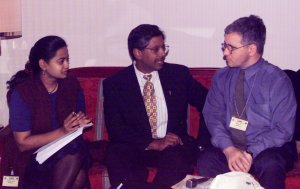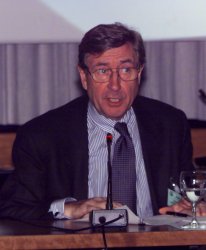| |
Interview
with Ramakrishna
Kilaparti Ramakrishna
(center), Woods Hole Research Center, with Lavanya Rajamani and Peter
Doran, ENB. In a wide ranging interview Ramakrishna addresses AIJ and
CDM, compliance, the forthcoming programme of work leading up to COP-6
and the prospects for a successful outcome.
How
Industry Makes Investment Decisions and Transfers Environmentally Friendly
Technologies
This side event,
convened by the International Energy Agency and the Business and Industry
Advisory Committtee to the OECD addressed the important role that the
transfer of technology will play in achieving emissions reductions and
enhancing the participation of economies in transition and developing
countries in the sustainable development process.
The side event highlighted
the lessons to be learned from the private sector's investment experience
in developing countries together with the implications for the design
of the CDM as well as achieving the transfer of technology under the Convention
and the Protocol.
 Kristi Varangu of the International Energy Agency comments on the
IEA and industry interests in JIA and CDM processes, underlining
the importance of private sector involvement, shared resources,
and transfers of technologies.
Kristi Varangu of the International Energy Agency comments on the
IEA and industry interests in JIA and CDM processes, underlining
the importance of private sector involvement, shared resources,
and transfers of technologies.
|
 Klaus Kohlhase of the Business and Industry Advisory Committee (BIAC)
to the OECD, summarizes private sector involvement in the transfer
of technologies, maintaining sound business flows, and influence
in policies dealing with labour, the environment, and sustainable
development.
Klaus Kohlhase of the Business and Industry Advisory Committee (BIAC)
to the OECD, summarizes private sector involvement in the transfer
of technologies, maintaining sound business flows, and influence
in policies dealing with labour, the environment, and sustainable
development.
|
|
|
Olivier
Appert, EIA
|
|
Thomas
G. Burns, Chevron Corporation
|
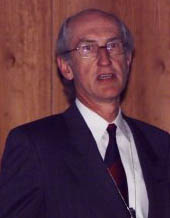
|
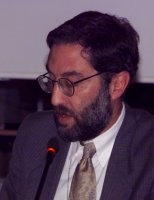 The
Global Environment Facility and its capacity-building for the technology
transfer programme The
Global Environment Facility and its capacity-building for the technology
transfer programme
Since 1991,
the Global Environment Facility (GEF) and its three implementing agencies
(UNEP, UNDP and the World Bank) have assisted developing countries
and countries in transition in promoting energy-efficiency and renewable-energy
technologies. GEF strategies for such assistance have evolved to meet
national development goals and global climate change objectives.
This side event
focused on GEF's role in building capacity for the transfer of technology,
one of the key areas of action addressed in the Buenos Aires Action
Plan.
 Alan Miller, Team Leader of the Climate Change and Ozone Depletion division
(right), outlines the Global Environment Facility's capacity building
program and notes that projects need to be country driven in order to
remain consistent with national priorities and local needs. During the
question and answer session following his presentation, Miller comments
on GEF's work on CDM.
Alan Miller, Team Leader of the Climate Change and Ozone Depletion division
(right), outlines the Global Environment Facility's capacity building
program and notes that projects need to be country driven in order to
remain consistent with national priorities and local needs. During the
question and answer session following his presentation, Miller comments
on GEF's work on CDM.
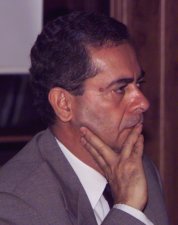
|
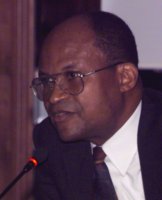
|
|
Isaias de Carvalho
Macedo, Copersucar
|
Hutton G. Archer,
GEF
|
|
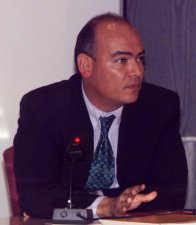 Lessons
learned from the AIJ pilot phase for the design of the CDM: experiences
with projects in developing countries Lessons
learned from the AIJ pilot phase for the design of the CDM: experiences
with projects in developing countries
This
event was sponsored by the German delegation in collaboration
with the Deutsche Gesellschaft für Technische Zusammenarbeit (GTZ)
and the Wuppertal Institute for Climate, Environment and Energy.
Peruvian delegates Patricia Iturregui, Rosa Morales and Alberto
Pasco-Font (National Council for the Environment, Peru, left)
gave a presentation on UNDP capacity building in CDM project activities,
highlighting two potential CDM projects, on boilers and taxis.
They
highlighted the criteria for choosing a CDM project, including
project and sustainable development criteria, and selected mitigation
options for both boilers and taxis. They cited financial barriers
and the current economic recession as obstacles. The presentation
also explored CDM and JI project baselines in the form of a baseline
proposal, which compares CDM/JI project emissions with Annex I
average emissions for the same category of projects (multi-project
baseline) in order to calculate CERs.
|
|
Present
and future trends of CO(2) concentrations, accounting for the trajectories
of the sinks and economic growth
During this
event, sponsored by the Global Dynamics Institute, Alberto Di Fazio,
Astronomical Observatory of Rome (e-mail: difazio@oarhp1.rm.astro.it),
gave a presentation on deforestation. He argued that the IPCC fails
to take account of deforestation in its work on sinks. He also presented
a model for improved understanding of global temperature increases.
|
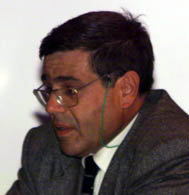 |
 To listen to IISD's RealAudio coverage of the COP-5
deliberations and side-events you will need the RealAudio Player. Download
the free Real Audio player by clicking on this button.
To listen to IISD's RealAudio coverage of the COP-5
deliberations and side-events you will need the RealAudio Player. Download
the free Real Audio player by clicking on this button.

|

 Friday,
29 October
Friday,
29 October 

